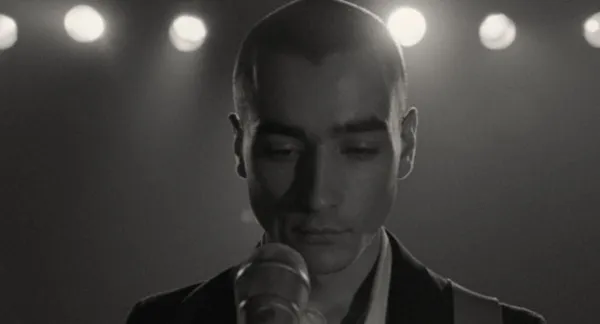Eye For Film >> Movies >> Erasing Frank (2021) Film Review
Erasing Frank
Reviewed by: Mateusz Tarwacki

Regardless of their place in time, images of youth have a universal counterculture potential. Rebellion, the drama of an individual, criticism of social relations or the political system – most of the characteristics of the rebellious sturm und drang constitute the axis of Gábor Fabricius’ feature-length film debut, Erasing Frank. Although the portraits of oppressed youth are well known to cinema, and especially to political cinema referring to the former Eastern Bloc, one cannot help feeling that the Hungarian director's film is more than just a reminder of the difficult past times.
Frank (Benjamin Fuchs), is the vocalist and leader of a punk band who bravely defy the dystopian political system. The concerts are held in secret, hidden from the apparatus of the authorities. But loud cries for freedom cannot be hidden for long. Soon, during one of the concerts, Frank is arrested and imprisoned in a psychiatric facility. There, according to the party line, psychiatric drugs are used in the fight against the opposition, at the expense of the health and life of inmates. But it is in such conditions that he begins the unequal fight for freedom, inspired by Hanna (Kincsö Blénesi), a girl who has never even heard of punk dreams of freedom.

Although Erasing Frank is a film set in 1983, the political commentary on state censorship and restriction of freedom is all too clear. Punk rock seems to fit perfectly not only with the times of the Hungarian People's Republic, but also with the contemporary political conditions in Hungary – the atmosphere of restricting freedom of speech and sweeping counterculture under the carpet.
The interactions between Frank and Erös (István Lénárt), a cultural leader of the state, seem particularly interesting. The clash of youth and old age could not be portrayed more clearly. Even despite the health damage, Frank looks livelier in contrast to Erös. The old apparatchik is barely on his feet, and his story of understanding rebellion and the destructive energy of youth is almost caricatured.
While it's hard to say that Fabricius's film is completely fresh, it is undoubtedly up-to-date and effective. The dynamic style of Tamás Dobos's cinematography is reminiscent of the anxiety and dread present in the Son of Saul by László Nemes – in both films the characters are dehumanised, as if they were sacks of meat, not people. The camera accompanying the protagonist is right next to his shoulder, in intimate proximity, and holds the viewer's attention for a long time.
One cannot deny the cleverness of Hungarian director who raises two fingers towards the present Hungarian state. He is comparing it to communism which the state hates more than anything in the world. Erasing Frank is brilliant in its simplicity.
Reviewed on: 06 Sep 2021

















